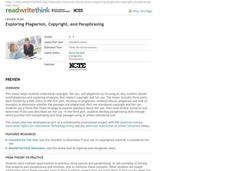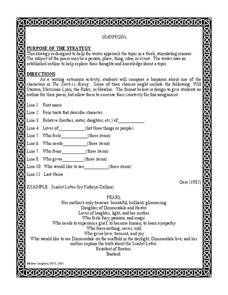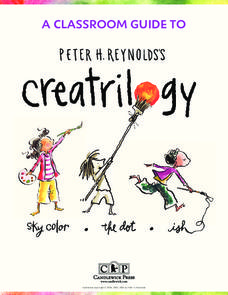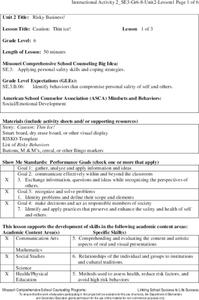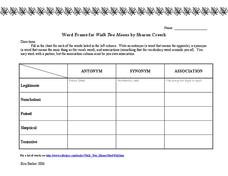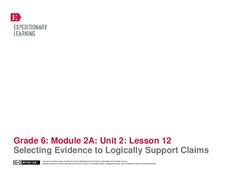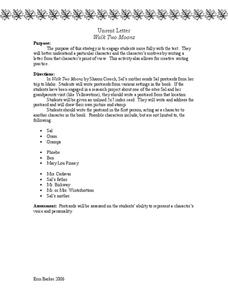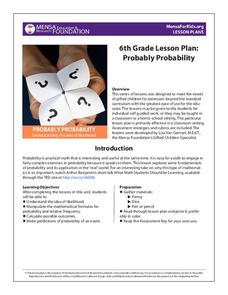Macmillan Education
Communicate/Cooperate
Prepare pupils to communicate effectively throughout their lives with this set of worksheets and activities, which are part of a 23-lesson series on valuable life skills. Class members will define communication and cooperation, discuss...
ReadWriteThink
Exploring Plagiarism, Copyright, and Paraphrasing
Plagiarism, copyright, and fair use are the focus of a three-part instructional activity designed to inform scholars of how to properly cite others' work. First, pupils use a KWL chart to begin thinking and discussing plagiarism. They...
Novelinks
The Dark Is Rising: Biopoem
How well do your learners really know the characters in Susan Cooper's The Dark is Rising? A biopoem activity prompts readers to investigate the characters and their traits. Line by line, writers add the characters' relatives,...
Really Good Stuff
English/Spanish Cognates: Food
Everyone loves food! Help your English language learners pick up some vocabulary with a series of activities based around cognates and food. Pupils practice each word and focus on the words in-depth by filling out Frayer model...
Museum of Tolerance
Family Role Model Activity
What does is take to be a role model? Through grand conversation, and the use of books and a graphic organizer, scholars find out and apply the requirements to identify a role model within their family. They then journey through the...
Federal Trade Commission
Ad Targeting and Techniques
What techniques do advertisers use to reach a target audience? Pupils discover the answer with the second of four Admongo lesson plans. Scholars learn about the most common strategies advertisers use to convince people to buy something....
K12 Reader
What Do You See? (Inferences)
Making inferences is a skill that goes beyond the comprehension of written text. In this simple exercise, young learners are provided with a photograph and asked to answer a series of inference questions using only on the information...
EngageNY
Real-World Positive and Negative Numbers and Zero
Class members investigate how positive and negative numbers are useful in the real world. Individuals first read a short passage and identify terms indicating positive and negative numbers. They consider situations involving positive...
Candlewick Press
A Classroom Guide to Peter H. Reynolds's Creatrilogy
Help young readers find, identify, and use their voices with a set of empowering activities based on Peter H. Reynolds' trilogy of books. Sky Color, Ish, and The Dot focus on recognizing moods and treating each other kindly, and their...
Read Theory
Analogies 2 (Level 6)
Activate analogy skills with a straightforward exercise. Learners complete 10 analogies, using the bridge sentences provided as support while they determine word relationships.
Math Stars
Math Stars: a Problem-Solving Newsletter Grade 7
Put on your thinking caps because middle school math has never been more interesting in this huge resource full of thought provoking questions. Written as a newsletter, the resource has 10 two-page newsletters with a variety of...
Meadows Center for Preventing Educational Risk, University of Texas at Austin
Lesson 12 - Ed Suffix with Unchanging Base Words
Understanding different verb tenses begins with knowing how to decode words. A lesson on the -ed suffix with unchanging base words introduces readers to the past tense. Teachers present the skill with oral reading and spelling...
Teaching Tolerance
The Privacy Paradox
What's more important: privacy or convenience? Scholars consider the question as they take a digital privacy quiz and read a transcript of an NPR podcast about the privacy paradox. As a culminating activity, pupils develop a list of five...
Missouri Department of Elementary
Caution: Thin Ice!
Sixth graders listen to a story titled "Thin Ice!" then partake in a whole-class discussion asking and answering questions about what was read. Scholars brainstorm risky behaviors in preparation for a game of RISKO—a game similar to...
Novelinks
The Little Prince: Response to Art Exercise
Depending on your perspective, solitude can be lovely or very, very lonely. Kids take a look at the simple landscape illustrated in Antoine de Saint Éxupery's The Little Prince, and write a short journal entry about their perception of...
EngageNY
Writing: Drafting Body Paragraphs and Revising for Language
Begin the drafting phase of the writing process with a lesson plan focused on logically writing three body paragraphs. Then, revise the writing to make it more formal after a teacher-directed mini-lesson plan. Each paragraph highlights...
Curated OER
Walk Two Moons: Word Frame
Middle schooler practice their dictionary and thesaurus skills with this vocabulary assignment. Using the provided graphic organizer and the word list from Walk Two Moons by Sharon Creech, readers define each word, and find a synonym...
EngageNY
Looking Closely at Stanza 3—Identifying Rules to Live By Communicated in “If”
Just as Bud, from the novel Bud, Not Buddy by Christopher Paul Curtis, had rules to live by, so does the poem, If by Rudyard Kipling, but how do the two relate? Pupils delve deep into the poem's third stanza, participate in a grand...
EngageNY
Selecting Evidence to Logically Support Claims
It's time to make a rule sandwich! After exploring the writing assignment's rubric and analyzing a model essay, learners are guided through the prewriting phase using the sandwich technique. Pupils create their sandwich addressing the...
Novelinks
Walk Two Moons: Unsent Letter
Take a journey with your class as they explore the different settings from Walk Two Moons by Sharon Creech. Middle schoolers write postcards in first person as if they were the characters of the story.
EngageNY
Planning for Writing: Introduction and Conclusion of a Literary Argument Essay
After completing three body paragraphs of an argument essay about life's rules to live by from Bud, Not Buddy Christopher Paul Curtis, it's time to begin writing the introduction and conclusion. Independently, pupils draft the final two...
Curated OER
Hoot: Vocabulary Squares
Study the vocabulary from Carl Hiaasen's Hoot with an activity featuring synonyms and antonyms. Kids fill in a graphic organizer for each word, prompting critical thinking as they find additional ways to put the word into context.
MENSA Education & Research Foundation
Probably Probability
Reinforce the concept of probability with a series of lessons highlighting the idea of likelihood, probability formulas, relative frequency, outcomes, and event predictions. The collection is made up of four lessons offering informative...
ReadWriteThink
A Picture's Worth a Thousand Words: From Image to Detailed Narrative
A picture's worth a thousand words—and even more inspiration! A visual activity uses photographs to inspire writers. The process teaches aspects of narrative writing, such as point of view and characterization.



